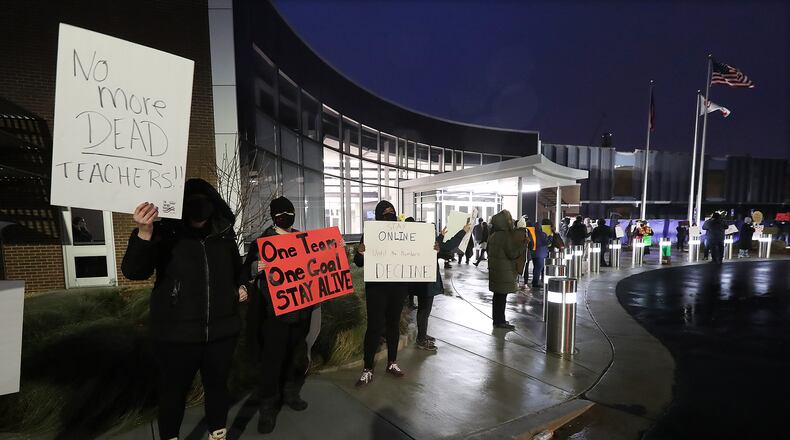Georgia now ranks sixth worst in the nation for the rate of new coronavirus infections and has vaulted up the rankings for the rate of fatalities, according to a federal report.
The latest White House report contained dire warnings that Georgia and other states need to step up mitigation efforts.
“Overall, this fall and winter surge is more aggressive, with more rapid community spread that will need to be continuously met with aggressive and escalating mitigation,” the report said.
A bit of good news: Hospitalizations have dipped slightly since a peak earlier this month.
Here’s a look at major COVID-19 developments over the past week.
Credit: HYOSUB SHIN / AJC
Credit: HYOSUB SHIN / AJC
Kemp: More COVID-19 vaccine doses needed
Gov. Brian Kemp and state health officials stressed the state has far more demand for COVID-19 vaccines than supply.
In the face of mounting criticism, state officials also said that they are working to improve the vaccination rollout.
Many elderly residents have had trouble making appointments or setting up times to get a second shot. They have complained that county websites aren’t working or no one is answering or returning telephone calls. Officials said the state is working to streamline the process for getting appointments.
Officials also said they are working on plans to expand the number of vaccine providers and noted that more people are volunteering to help with the vaccination administration process.
For now, Kemp said, there are no immediate plans to expand vaccine eligibility as the state waits on more information from President Biden’s administration about its distribution plan.
U.K. variant strain detected in more Georgians
Georgia now has five confirmed cases of the highly infectious U.K. strain of the virus, according to the Centers for Disease Control and Prevention. That includes a case in Cobb County. Only a tiny fraction of COVID tests are analyzed for the strain, so experts say it is likely that it is much more prevalent that the numbers indicate.
By March, according to a CDC study, the U.K. strain could become the dominant one in the U.S., which would mean more cases, more hospitalizations for struggling hospitals and, ultimately, more deaths.
This month, researchers at Ohio State University reported finding a unique American strain with similar characteristics to the U.K. variety that has overloaded hospitals and forced a third national lockdown in England.
Credit: Curtis Compton / Curtis.Compton@
Credit: Curtis Compton / Curtis.Compton@
Cobb teachers demand classrooms stay closed
Hours after two Cobb County educators died of COVID-19, more than 100 teachers, students, parents and community members packed the parking lot outside a Cobb County Board of Education meeting to demand the school district continue with remote-only learning.
Two educators — Kemp Elementary School teacher Dana Johnson and Sedalia Park Elementary School paraprofessional Cynthia Lindsey — died Thursday from COVID-19. Patrick Key, another Cobb educator, died Christmas Day after a month-long battle with the disease.
Protesters lined the parking lot holding signs, some of which read “How many GoFundMe campaigns?” and “No more teacher deaths.”
Connie Jackson, president of the Cobb County Association of Educators, said teachers showed up to the protest “because they are scared, they are mad, and they are angry.”
The district canceled in-person learning the week of Jan. 18 due to the high number of students and staff with COVID-19 or in quarantine due to being exposed to the coronavirus.
Along with keeping classrooms closed until coronavirus case numbers begin to drop, educators who spoke Thursday night want the school system to let teachers with pre-existing conditions teach from home. Educators should be given the option of teaching either remote-only students or pupils who are in the classroom, they said.
New head of the CDC
Dr. Rochelle Walensky, 51, an infectious-diseases specialist at Harvard Medical School and Massachusetts General Hospital, is new director of the Centers for Disease Control and Prevention.
She takes the helm at a time when the virus’s U.S. death toll has eclipsed 400,000 and continues to accelerate.
Walensky said one of her top priorities will be to improve the CDC’s communications with the public to rebuild trust. Inside the agency, she wants to raise morale, in large part by restoring the primacy of science and setting politics to the side.
The speed at which she is assuming the job is unusual. In the past, the position has generally been unfilled until a new secretary of health and human services is confirmed, and that official names a CDC director. But this time, the Biden transition team named Walensky in advance, so she could take the agency’s reins even before her boss is in place.
Staff writer Kristal Dixon and The Associated Press contributed to this report.
The Latest
Featured







